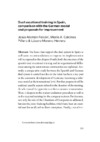Please use this identifier to cite or link to this item:
https://accedacris.ulpgc.es/jspui/handle/10553/106675
| DC Field | Value | Language |
|---|---|---|
| dc.contributor.author | Alemán Falcón, Jesús | en_US |
| dc.contributor.author | Calcines Piñero, María Ascensión | en_US |
| dc.contributor.author | Moreno Herrera, Lázaro | en_US |
| dc.date.accessioned | 2021-04-09T14:15:08Z | - |
| dc.date.available | 2021-04-09T14:15:08Z | - |
| dc.date.issued | 2019 | en_US |
| dc.identifier.isbn | 978-91-89077-01-0 | en_US |
| dc.identifier.uri | https://accedacris.ulpgc.es/handle/10553/106675 | - |
| dc.description.abstract | Te bases that support the dual system in Spain as well some recommendations to improve its implementation will be exposed in this chapter. Firstly, both the structure of the spanish dual vocational training and its organizational diferences among the autonomous communities are explained. Secondly a comparative study between the Spanish and German dual system is carried out due to the latter has been a key part in the economic development of Germany, becoming a reference model at the international level. For that purpose it will be analyzed specifc aspects related to the duration of the training, the selection of the apprentices or their economic remuneration. Ten, it deepens in the student evaluation procedure as well as in the required training for the company trainers. Furthemore, not only the role of the Chambers of Companies is addressed, but also the Joint Training Facilities, which have been an essential tool for small and medium enterprises. Finally, a set of recommendations for the improvement of the Spanish dual system are presented | en_US |
| dc.language | eng | en_US |
| dc.publisher | Premiss förlag | en_US |
| dc.source | Facets and Aspects of Research on Vocational Education and Training at Stockholm University / Lázaro Moreno Herrera, Marianne Teräs & Petros Gougoulakis (eds.), p. 333-361 | en_US |
| dc.subject | 58 Pedagogía | en_US |
| dc.subject.other | Dual system | en_US |
| dc.subject.other | Apprenticeship | en_US |
| dc.subject.other | Comparative studies in VET | en_US |
| dc.title | Dual vocational training in Spain, comparison with the German model and proposals for improvement | en_US |
| dc.type | info:eu-repo/semantics/bookPart | en_US |
| dc.type | BookPart | en_US |
| dc.investigacion | Ciencias Sociales y Jurídicas | en_US |
| dc.type2 | Capítulo de libro | en_US |
| dc.utils.revision | Sí | en_US |
| dc.identifier.ulpgc | Sí | en_US |
| dc.identifier.ulpgc | Sí | en_US |
| dc.identifier.ulpgc | Sí | en_US |
| dc.identifier.ulpgc | Sí | en_US |
| dc.contributor.buulpgc | BU-EGB | en_US |
| dc.contributor.buulpgc | BU-EGB | en_US |
| dc.contributor.buulpgc | BU-EGB | en_US |
| dc.contributor.buulpgc | BU-EGB | en_US |
| item.fulltext | Con texto completo | - |
| item.grantfulltext | open | - |
| crisitem.author.dept | GIR Educación Inclusiva, Sociedad y Familia | - |
| crisitem.author.dept | Departamento de Educación | - |
| crisitem.author.dept | GIR Educación Inclusiva, Sociedad y Familia | - |
| crisitem.author.orcid | 0000-0001-9233-3678 | - |
| crisitem.author.orcid | 0000-0002-1893-0682 | - |
| crisitem.author.parentorg | Departamento de Educación | - |
| crisitem.author.parentorg | Departamento de Educación | - |
| crisitem.author.fullName | Alemán Falcón, Jesús Ariel | - |
| crisitem.author.fullName | Calcines Piñero,María Ascensión | - |
| Appears in Collections: | Capítulo de libro | |
Page view(s) 5
421
checked on Jan 15, 2026
Download(s)
343
checked on Jan 15, 2026
Google ScholarTM
Check
Altmetric
Share
Export metadata
Items in accedaCRIS are protected by copyright, with all rights reserved, unless otherwise indicated.
